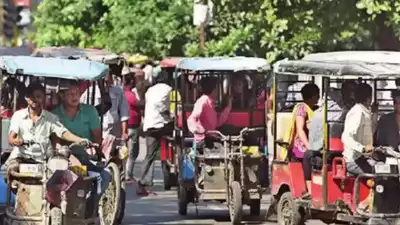Nagpur: Despite the ban imposed by the Regional Transport Authority (RTA) on e-rickshaws from plying on major roads in Nagpur, a significant violation was observed on busy thoroughfares, notably Amravati Road, as reported by local media. The ban, initiated in 2022 to alleviate traffic congestion, restricted e-rickshaws from plying on 13 main thoroughfares, confining their operation to internal roads and specific areas.
The scenario witnessed on major roads such as Central Avenue, Wardha Road, and Amravati Road depicts a clear failure of the ban’s enforcement. Hundreds of battery-powered rickshaws continue to impede traffic flow, congest entry/exit points of railway stations, and cause frequent traffic jams in areas where their operation is prohibited.
As per the amended sections of the Motor Vehicles Act 1988 Section 66 (3) (N) and Section 115 of the Act, e-rickshaws, categorized as non-motorised vehicles due to their motor power (less than 250w) and restricted speed (less than 25kmph), were barred from specific main roads and state highways.
The roads banned for e-rickshaws include Wadi to Sitabuldi, Sitabuldi to Central Avenue (Bhandara road till Pardi Naka), Sitabuldi to Kamptee road (Jabalpur road), Sitabuldi to Chhatrapati Square (Wardha Road), entire ring road, Sitabuldi to Hingna Road, Sitabuldi to Katol Naka, Sitabuldi to Saoner Road (Chhindwara Road), Sitabuldi to Nandanwan, Sitabuldi to Hudkeshwar, Sitabuldi to Besa, all major roads and state highways.
Apart from causing traffic chaos and hindering smooth vehicular movement, these slow-moving e-rickshaws contribute substantially to the city’s air pollution. Environmentalists note that these vehicles often become a bottleneck for faster-moving cars, leading to increased emissions and pollution levels in the vicinity.
The lack of adherence to the ban on e-rickshaws accessing main roads in Nagpur has resulted in severe traffic disruptions and environmental concerns. Immediate action and stricter enforcement of the imposed restrictions seem imperative to mitigate the escalating problems caused by this violation.

















